Award winning dermatology service, with over 20 years on experience
Short waiting lists, on some occasions offering same week appointments
Safe environment, in Care Quality Commission approved facilities
PSORIASIS Treatments Include:
psoriasis treatment canterbury
Psoriasis is a skin condition that affects around 2% of people in the UK; it can start at any age but mainly occurs in adults under 35 years old, affecting men and women equally. The condition causes red, flaky patches to form on the skin, which are crusty and covered with silvery scales.
Psoriasis can appear anywhere on the body, but most commonly affects the elbows, knees, lower back, buttocks and scalp.
The severity of psoriasis varies a great deal from person to person, with some people experiencing it as a minor irritation, whilst for other people it can have a major impact on their quality of life. Severe psoriasis can cause low self-esteem, as well as the discomfort and pain that can occur with flare-ups of the rash.
Alternative names: Chronic plaque, guttate, nummular/discoid, palmoplantar pustular, pustular, annular pustular, generalized pustular] – psoriasis, seborrhoeic dermatitis, sebopsoriasis.
What causes Psoriasis?
Psoriasis is an autoimmune disease with symptoms that tend to come and go. Rather than being a problem of the skin’s surface, psoriasis is actually caused by rapid production of immature skin cells due to malfunctioning of the immune system. Research suggests that psoriasis also has a genetic component and can be triggered by physical or emotional stress, as well as certain prescriptions and over-the-counter medications.
WHAT ARE THE SYMPTOMS/TYPES OF PSORIASIS?
The severity of psoriasis varies a great deal from person to person, with some people experiencing it as a minor irritation, whilst for other people it can have a major impact on their quality of life. Severe psoriasis can cause low self-esteem, as well as the discomfort and pain that can occur with flare-ups of the rash. There are several clinical patterns of psoriasis (see pictures):
- Chronic Plaque – The most common variant, it tends to occur on the extensor aspects of the elbows and knees and in the scalp. Skin changes include pink or red inflamed, thickened plaques with copious white scale (see image).
- Sebopsoriasis – Similar to scalp psoriasis but can occur on the face, chest, armpits and groin.
- Flexural – Raw, red areas in the groin, armpits or under the breasts.
- Guttate – Multiple small spots of psoriasis that erupt on the trunk following a sore throat or illness (see image).
- Erythrodermic – Extensive disease covering more than 90% of the body surface area.
- Palmoplantar pustular – Pus-filled inflamed spots and the palms and soles.
- Pustular – The most severe form of psoriasis, skin lesions are red, tender and filled with pus spots.
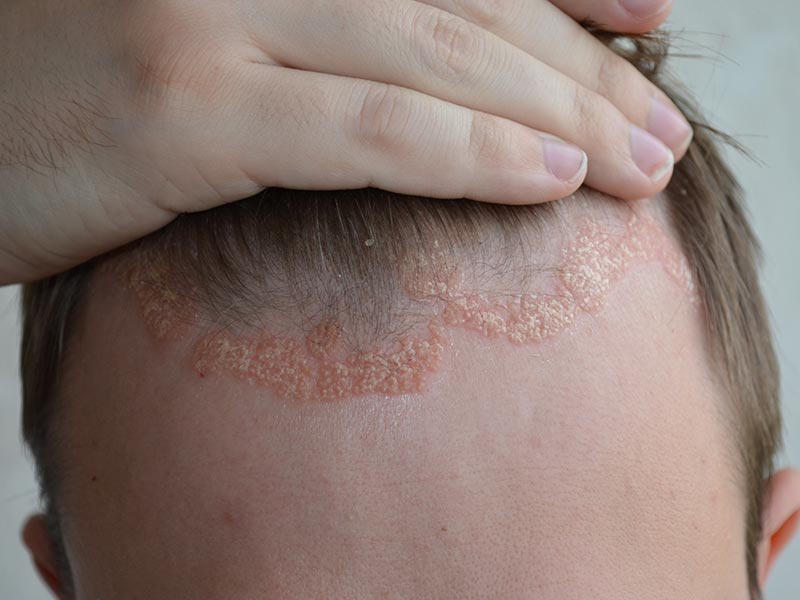
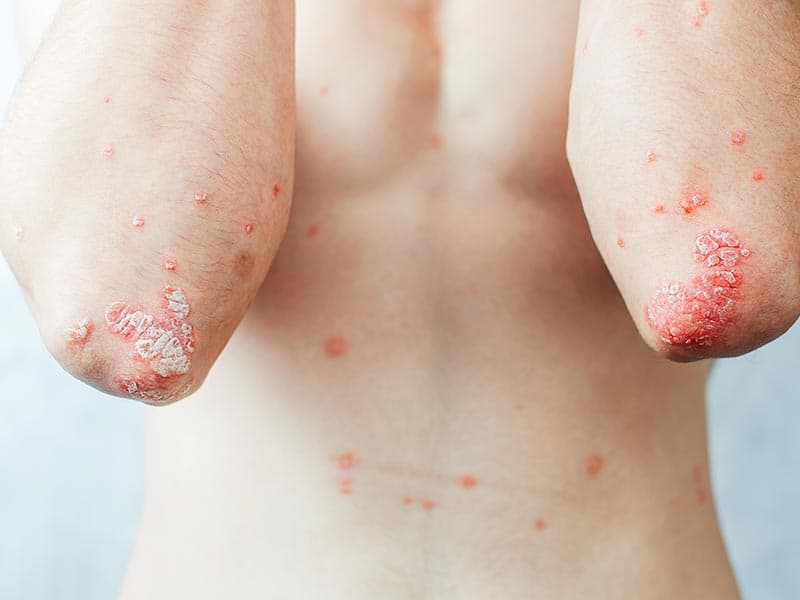
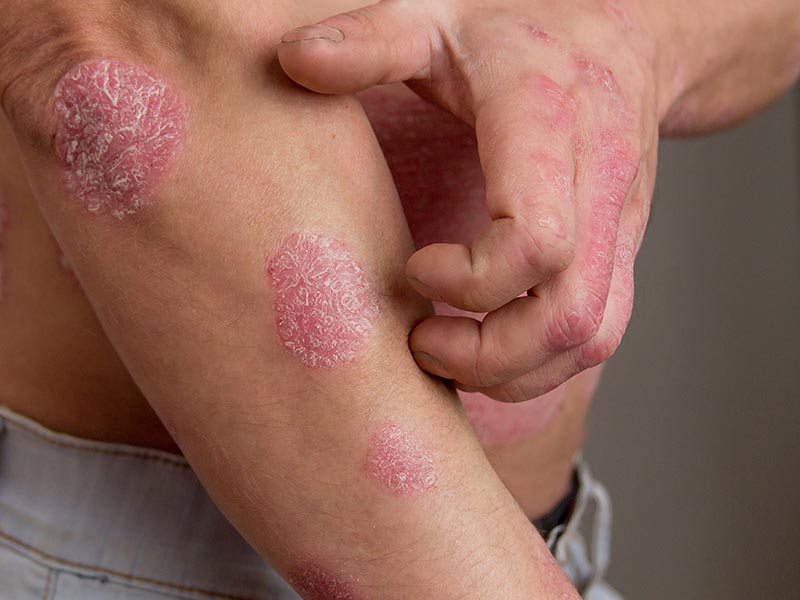
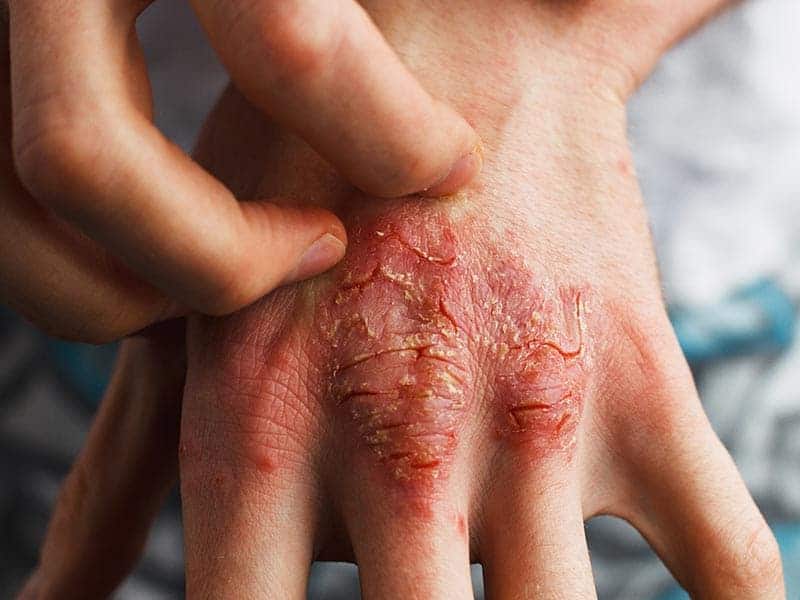
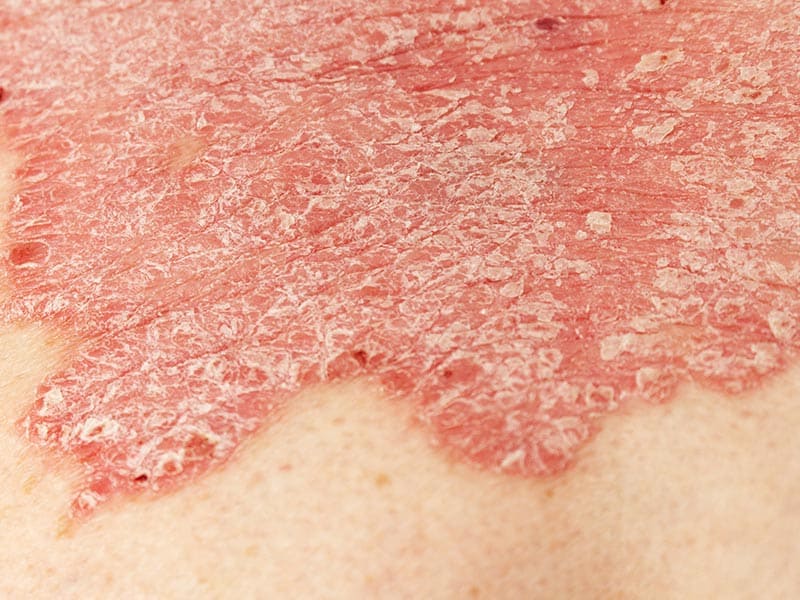
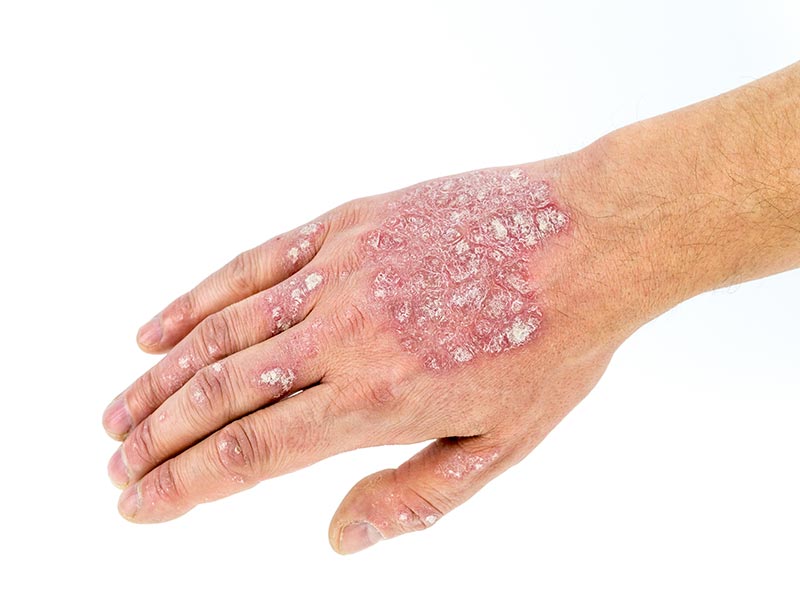
HOW CAN PSORIASIS BE TREATED?
Although there is no cure for psoriasis, our consultant dermatologists are ready to offer sufferers with expert treatment that can drastically improve their symptoms. Emollients, soap substitutes, vitamin D and tar creams are all readily available for use at home, whereas phototherapy treatments are administered at our clinic. The process entails precise doses of ultraviolet light delivered by a specialised apparatus overseen by qualified nurses and physician’s assistants. Depending on your needs, sessions may start out at 2 or 3 times per week in order to ensure the best possible results.
FREQUENTLY ASKED QUESTIONS
WHAT IS IT LIKE TO HAVE PSORIASIS?
Psoriasis can vary in severity from no more than a minor irritation to being a major problem – in extreme cases, sometimes requiring hospitalisation. Even a small bit of psoriasis in a delicate area such as the face or genitals can cause immense distress. Occasionally it can be itchy or cause painful splitting or fissuring of the skin. As well as the skin being affected, the nails can become abnormally brittle with flaking and pitting. 5% of patients might develop arthritis associated with psoriasis. Although psoriasis is incurable, it can be well controlled with medication.
WHAT ADVICE CAN YOU GIVE FOR LIVING WITH PSORIASIS?
In addition to receiving specific treatment for psoriasis flare-ups, it’s also important that you self-manage your skin condition in order to minimise and prevent flare-ups from happening. Maintaining good physical and mental health will ensure that your immune system is strong and will lessen the risk of joint pain and fatigue that can be associated with psoriasis. Stress is often a trigger for flare-ups of psoriasis and other skin conditions, so beneficial for your health if you can avoid stress as much as possible.
If you’d like to find out more about how we can help you to manage your psoriasis effectively in the long term, please contact us and we’ll arrange a consultation with one of our dermatology specialists.
IS PSORIASIS GENETIC?
Psoriasis can run in families so if you have a close family member who suffers from the condition then you are more likely to have it too. The exact role genetics play in psoriasis is unclear.
WHAT CAN TRIGGER PSORIASIS?
Common psoriasis triggers include:
- an injury to the skin
- alcohol
- smoking
- stress
- puberty
- menopause
- immune disorders
- certain medications
IS PSORIASIS CONTAGIOUS?
No, psoriasis is not contagious
REQUEST A CALL BACK
Please fill in this form and one of our team will give you a call back to arrange a consultation with one of our expert dermatologists.
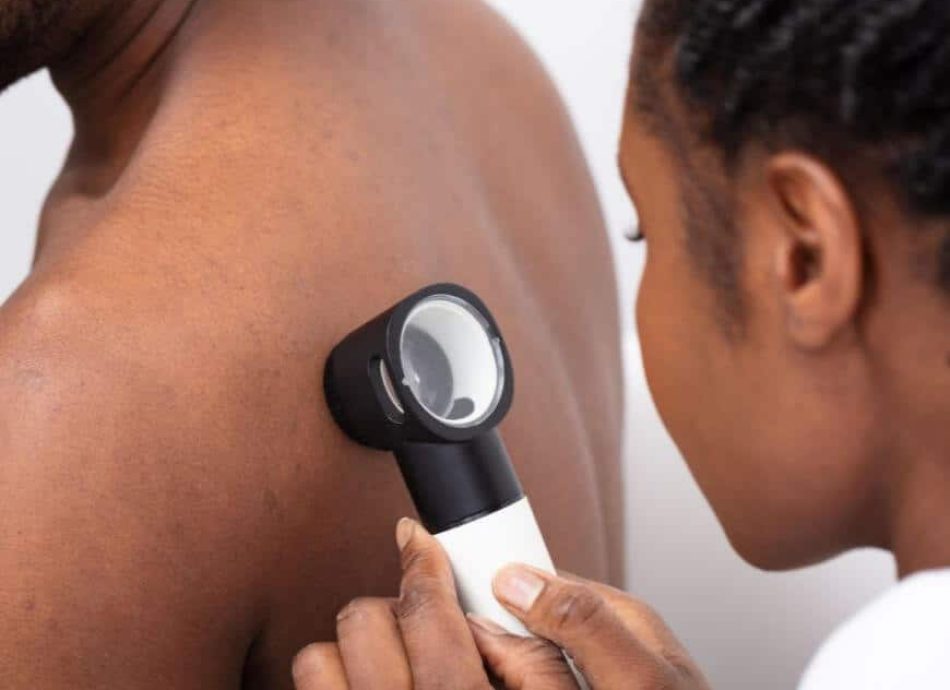
What our Customers Say
WHY CHOOSE US FOR psoriasis treatment IN canterbury?
Here at Kent’s leading private skin and laser clinic, our experts are specialists in all aspects of dermatology, skin cancer, anti-ageing and beauty treatments. We are one of the few skin clinics in the UK where all medical consultations and treatments are provided by specialist doctors with Dermatology experience and laser training.
Canterbury Skin and Laser Clinic is regulated by the Care Quality Commission, ensuring the best level of treatment is provided to you in a safe environment. Our Clinical Lead Dr Mark Hudson-Peacock is a member of the British Association of Dermatologists, the British Laser Medical Association, the British Hair and Nail Society, the European Academy of Dermatology and Venereology and is certified by the Consulting Room. We have won many awards including the WhatClinic Patient Service Award in 2019 and the ghp Healthcare and Pharmaceutical Awards 2019.
PSORIASIS INSIGHTS AND ADVICE

Complete Fall Skincare Guide
Embrace the season of transformation – Autumn. With its vibrant hues, this magical time of year also brings unique challenges for your skin. As the crisp air sets in and the days grow shorter, it’s not only autumn we’re welcoming but also the reminder that
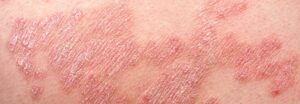
Comprehensive Guide to Understanding Eczema
October is globally observed as Eczema Awareness Month, drawing focus to the people grappling with this challenging skin condition. Our mission, not just in October but always, is to empower you with robust knowledge about eczema‘s root causes, various treatments and useful coping techniques. This
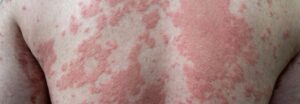
Unravelling Psoriasis: The Focus of Psoriasis Awareness Month
Each August, we commemorate Psoriasis Awareness Month, a time dedicated to elevating public understanding of psoriasis – a chronic skin ailment affecting countless individuals worldwide. The initiative is designed to dispel myths surrounding psoriasis, encourage early detection and advocate for impactful treatment methods. To those








